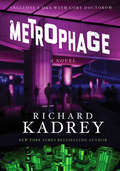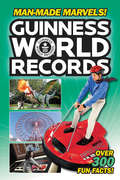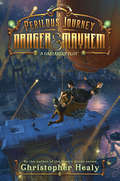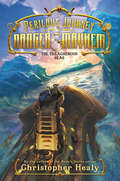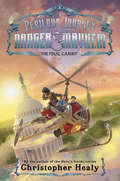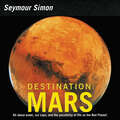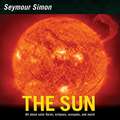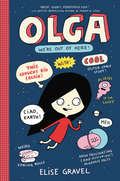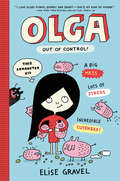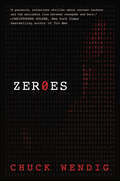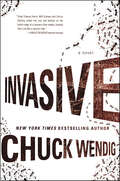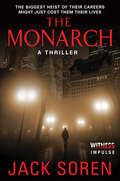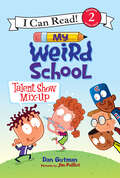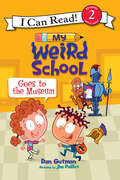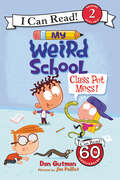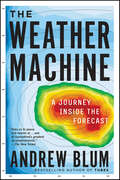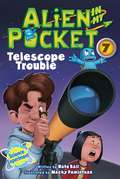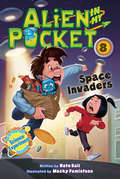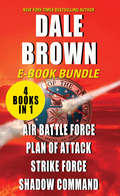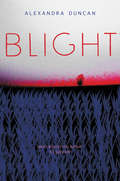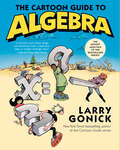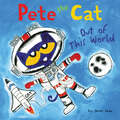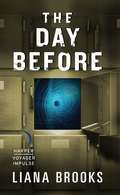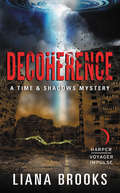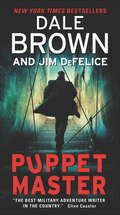- Table View
- List View
Metrophage
by Richard KadreyThe cult-classic dystopian cyberpunk tale from New York Times bestselling author Richard Kadrey, after twenty years, now back in print in a special signed, collectible editionWelcome to our future: L.A. in the late twenty-first century--a segregated city of haves and have-nots, where morality is dead and technology rules. Here, a small wealthy group secludes themselves in gilded cages. Beyond their high-security compounds, far from their pretty comforts, lies a lawless wasteland where the angry masses battle hunger, rampant disease, and their own despair in order to survive.Jonny was born into this Hobbesian paradise. A streetwise hustler who deals drugs on the black market--narcotics that heal the body and cool the mind--he looks out for nobody but himself. Until a terrifying plague sweeps through L.A., wreaking death and panic, and no one, not even a clever operator like Jonny, is safe.lude a Q & A with Cory Doctorow.
Guinness World Records: Man-Made Marvels!
by Donald LemkeA brand-new Guinness World Records book for kids!This Guinness World Records title is all about marvelous buildings, vehicles, machinery, and the people who dared to dream big by building them. Man-Made Marvels! showcases the most awe-inspiring constructions, including the steepest roller coaster, the tallest motorcycle, the smallest computer mouse, and more.Guinness World Records middle grade compilations are jam-packed with over 300 fun facts and full-color photos about all the record holders we can fit in one amazing theme! These books are perfect for Guinness World Records fans of all ages.
A Perilous Journey of Danger and Mayhem #1: A Dastardly Plot (Perilous Journey of Danger and Mayhem #1)
by Christopher HealyA rip-roaring, hilarious alternate-history adventure starring the world’s most famous inventors—and its most forgotten. From the author of the beloved Hero’s Guide series, Christopher Healy.It's 1883—the Age of Invention! A time when great men like Thomas Edison, Alexander Graham Bell, Nicola Tesla, and George Eastman work to turn the country into a land of limitless opportunity.And it all happens at the world famous Inventor’s Guild headquarters in New York City—a place where a great idea, a lot of hard work, and a little bit of luck can find you rubbing elbows with these gods of industry who will usher humanity into the future.Unless, of course, you’re a woman.Molly Pepper, daughter of brilliant but unknown inventor Cassandra Pepper, lives with her mother in New York. By day, they make ends meet running a pickle shop; but by night, they toil and dream of Cassandra taking her place among the most famous inventors in America.In an attempt to find a way to exhibit Cass’s work at the World’s Fair, they break into the Inventor's Guild, where they discover a mysterious plot to destroy New York.The evidence points to the involvement of one of the world’s most famous inventors, and now it’s up to Molly, Cassandra, and a shop hand named Emmett Lee to uncover the truth—even if no one will ever know it was they who did it.“Christopher Healy, author of the Hero’s Guide series, knows how to tell a good story. He’s done it again with the adventures of a determined girl named Molly Pepper.”—Brightly, Best Middle Grade Books of Fall 2018
A Perilous Journey of Danger and Mayhem #2: The Treacherous Seas (Perilous Journey of Danger and Mayhem #2)
by Christopher HealyThe second book in the new adventure trilogy from the beloved author of The Hero's Guide to Saving Your Kingdom.It's 1883—only a few months after Molly Pepper; her mother, Cassandra; and her friend, Emmett, saved New York from an attack by the megalomaniacal Ambrose Rector while managing to preserve the reputations of Alexander Graham Bell and Thomas Edison, whose technology was manipulated in Rector’s scheme. Their selfless heroism will finally earn them a place in the Inventors’ Guild, alongside the greatest minds of their generation.Unless, of course, no one knows that they did any of that.Left with nothing but empty promises and a struggling pickle shop after the government chooses to cover up the crisis, Molly, Cassandra, and Emmett have no idea where to turn—until they learn of a daring expedition to the South Pole, where an meteorite of mysterious power is embedded, and where Emmett’s father, explorer and ship captain Wendell Lee, disappeared years ago. With the fate of the world hanging in the balance, our heroes commandeer an experimental seacraft to make their play on the pole. But the trip is more treacherous than they realize, and there’s no guarantee that they will return successful—if they even return at all.
A Perilous Journey of Danger and Mayhem #3: The Final Gambit (Perilous Journey of Danger and Mayhem #3)
by Christopher HealyThe thrilling conclusion to Christopher Healy's funny, action-packed, acclaimed alt-history adventure!It is 1884, and Molly and Cassandra Pepper, Emmett Lee, and Emmett’s long-lost father are sailing back to New York following their death-defying adventure in Antarctica. Having discovered a subterranean world at the South Pole while saving the world from certain doom once again, surely their accomplishments will finally earn them the recognition they deserve.Unless, of course . . . well, you know by now.And so do the Peppers and Lees. They’re used to having their deeds covered up by the government in order to protect powerful men, and frankly, they’re sick of it. And when their return to New York doesn’t go the way they’d planned, they decide that maybe it’s best to go into hiding and accept that, perhaps, the forces aligned against them are just too great.As the 1884 presidential election approaches, however, our heroes discover a plot against leading candidate Thomas Edison that only they can stop. It’ll be up to them to decide whether to come out of hiding, make the perilous journey to Washington, DC, and do the right thing one last time. Even if it means risking everything they have left.
Destination: Revised Edition
by Seymour SimonAward-winning science writer Seymour Simon explores the Red Planet through fascinating facts and amazing full-color photographs. Readers will learn about the recent discovery of water, the Valles Marineris—the biggest valley on Mars—the ice caps, recent expeditions, and more. This nonfiction picture book is an excellent choice to share during homeschooling, in particular for children ages 6 to 8. It’s a fun way to learn to read and as a supplement for activity books for children.This updated edition includes:author’s notestunning full-color photographsglossaryindexwebsites and additional reading sourcesSupports the Common Core Learning Standards, Next Generation Science Standards and the Science, Technology, Engineering, and Math (STEM) standards.
The Sun (Seymour Simon Science Ser.)
by Seymour SimonIn this completely updated edition of The Sun featuring beautiful full-color photographs, Seymour Simon presents a fascinating introduction to the star that is the center of our Solar System.Young readers will love exploring the wonders of the sun, from the constant nuclear explosions at its core to the sea of boiling gases that forms its surface.Seymour Simon knows how to explain science to kids and make it fun. He was a teacher for more than twenty years, has written more than 250 books, and has won multiple awards.This book includes an author's note, glossary, and index and supports the Common Core Learning Standards, Next Generation Science Standards, and the Science, Technology, Engineering, and Math (STEM) standards.
Olga: We're Out of Here! (Olga #2)
by Elise GravelAnimal lover and kid scientist Olga is back! Great for fans of the acclaimed graphic novels Real Friends and Invisible Emmie.In this second installment of a series Franny K. Stein creator Jim Benton called “great, kooky, monstrous fun,” Olga wants to leave earth in search of Meh’s home planet, but first she’ll have to discover why Meh is acting so strange.Olga: We’re Out of Here is jam-packed with facts and fun: Elise Gravel’s classic comic illustrations, hilarious word bubbles, space travel facts, and a diverse cast of memorable characters.Brightly.com put Olga and the Smelly Thing from Nowhere on their "Ultimate Summer Reading List for 9- to 12-Year-Olds."And Kirkus said of it: “A visually interesting mix of illustration and story, punctuated by numerous lists, comic panels, and cartoon diagrams and led by a smart female protagonist. A bubble-gum crowd pleaser with wide audience appeal.”
Olga: Out of Control! (Olga #3)
by Elise GravelJoin Olga, the science-loving girl in the red dress, in her most wacky adventure yet! Perfect for fans of Dear Dumb Diary and My Big Fat Zombie Goldfish.In this third installment of the series, Olga’s beloved companion, Meh, is now a mom! She has a litter of adorable babies that look like spring rolls. But the babies aren’t just adorable—they’re a handful! How can Olga stop them from covering her house in rainbow poop if she’s busy making sure they’re fed?Can Olga keep it all under control? Packing in three times the girl power, hilarious quips, and kooky science facts of the previous books, Olga: Out of Control is sure to have kids laughing!
Zeroes
by Chuck Wendig“[A] high-octane blend of nervy characters, dark humor and bristling dialogue... smart, timely, electrifying.” — NPRAn exhilarating thrill-ride through the underbelly of cyber espionage in the vein of David Ignatius’s The Director and the television series Leverage, CSI: Cyber, and Person of Interest, which follows five iconoclastic hackers who are coerced into serving the U.S. government.An Anonymous-style rabble rouser, an Arab spring hactivist, a black-hat hacker, an old-school cipherpunk, and an online troll are each offered a choice: go to prison or help protect the United States, putting their brains and skills to work for the government for one year.But being a white-hat doesn’t always mean you work for the good guys. The would-be cyberspies discover that behind the scenes lurks a sinister NSA program, an artificial intelligence code-named Typhon, that has origins and an evolution both dangerous and disturbing. And if it’s not brought down, will soon be uncontrollable.Can the hackers escape their federal watchers and confront Typhon and its mysterious creator? And what does the government really want them to do? If they decide to turn the tables, will their own secrets be exposed—and their lives erased like lines of bad code?Combining the scientific-based, propulsive narrative style of Michael Crichton with the eerie atmosphere and conspiracy themes of The X-Files and the imaginative, speculative edge of Neal Stephenson and William Gibson, Zer0es explores our deep-seated fears about government surveillance and hacking in an inventive fast-paced novel sure to earn Chuck Wendig the widespread acclaim he deserves.
Invasive: A Novel
by Chuck WendigA gripping sci-fi tech thriller, set in the eye-opening, paranoid world of the electrifying Zeroes—from the New York Times–bestselling author of Wanderers.Hannah Stander is a consultant for the FBI—a futurist who helps the Agency with cases that feature demonstrations of bleeding-edge technology. It’s her job to help them identify unforeseen threats: hackers, AIs, genetic modification, anything that in the wrong hands could harm the homeland.Hannah is in an airport, waiting to board a flight home to see her family, when she receives a call from Agent Hollis Copper. “I’ve got a cabin full of over a thousand dead bodies,” he tells her. Whether those bodies are all human, he doesn’t say.What Hannah finds is a horrifying murder that points to the impossible—someone weaponizing the natural world in a most unnatural way. Discovering who—and why—will take her on a terrifying chase from the Arizona deserts to the secret island laboratory of a billionaire inventor/philanthropist. Hannah knows there are a million ways the world can end, but she just might be facing one she could never have predicted—a new threat both ancient and cutting-edge that could wipe humanity off the earth.“Enthralling . . . Wendig does an impeccable job blending fact and fiction as he describes invasive species and insects being used as biological weapons.” —The Washington Post“Think Thomas Harris’ Will Graham and Clarice Starling rolled into one and pitched on the knife’s edge of a scenario that makes Jurassic Park look like a carnival ride. Another rip-roaring, deeply paranoid thriller about the reasons to fear the future.” —Kirkus Reviews (starred review)
The Monarch: A Thriller
by Jack SorenFans of thrilling adventures and international suspense will love Jack Soren’s whirlwind debut novel—a tale of two thieves detoured on the road to redemption.Imitation is the deadliest form of flattery …When Jonathan Hall walked away from his career as an international art thief to be a father, he thought he’d made a clean break—from crime, from life as The Monarch, from an early grave.But when The Monarch’s signature symbol resurfaces, carved into the mutilated bodies of New York’s elite, Jonathan realizes his retirement may have been short-lived. Someone is framing The Monarch for horrific slayings. But Jonathan and his former partner, Lew, know this isn’t just murder—it’s a message.Now caught in a deadly game against a fanatical madman whose reach penetrates the darkest corners of the globe, Jonathan and Lew have no choice but to play along. But when Jonathan’s daughter becomes a pawn, all bets are off. To win this game, Jonathan and Lew will have to accept one final task as The Monarch—a job that could change the course of history forever.
My Weird School: Talent Show Mix-up (I Can Read Level 2)
by Dan GutmanA new series of Level Two I Can Read titles based on Dan Gutman’s My Weird School series, which has sold more than 12 million books!Mr. Cooper’s class is having a talent show. But A.J. has a problem—he doesn’t have a talent! What will he do when the big day comes? Join A.J. and the gang from Ella Mentry School as they show young readers why they attend the weirdest—and most fun!—school around.My Weird School: Talent Show Mix-Up is a Level Two I Can Read book, geared for kids who read on their own but still need a little help.
My Weird School Goes to the Museum (I Can Read Level 2)
by Dan GutmanThis fun Level Two I Can Read book, geared toward kids who read on their own but still need a little help, is based on Dan Gutman’s My Weird School series, which has sold more than 12 million books!A.J. and Andrea are taking a class trip to the museum! Their museum guide has been warned that one of them might misbehave. But who will it be? Join A.J. and Andrea from Ella Mentry School on this hilarious field trip as they show young readers why they attend the weirdest—and most fun!—school around.
My Weird School: Class Pet Mess! (I Can Read Level 2)
by Dan GutmanA new series of Level Two I Can Read titles based on Dan Gutman’s My Weird School series, which has sold more than 11 million books!Mr. Cooper's class is getting a pet! Alexia hopes it is something cool, like a snake. But is she ready to take care of the pet, or will it be one weird mess? Join A.J. and the gang from Ella Mentry School as they show young readers why they attend the weirdest—and most fun!—school around.My Weird School: Class Pet Mess is a Level Two I Can Read book, geared for kids who read on their own but still need a little help.
The Weather Machine: A Journey Inside the Forecast
by Andrew BlumFrom the acclaimed author of Tubes, a lively and surprising tour of the infrastructure behind the weather forecast, the people who built it, and what it reveals about our climate and our planetThe weather is the foundation of our daily lives. It’s a staple of small talk, the app on our smartphones, and often the first thing we check each morning. Yet behind these quotidian interactions is one of the most expansive machines human beings have ever constructed—a triumph of science, technology and global cooperation. But what is this ‘weather machine’ and who created it? In The Weather Machine, Andrew Blum takes readers on a fascinating journey through an everyday miracle. In a quest to understand how the forecast works, he visits old weather stations and watches new satellites blast off. He follows the dogged efforts of scientists to create a supercomputer model of the atmosphere and traces the surprising history of the algorithms that power their work. He discovers that we have quietly entered a golden age of meteorology—our tools allow us to predict weather more accurately than ever, and yet we haven’t learned to trust them, nor can we guarantee the fragile international alliances that allow our modern weather machine to exist.Written with the sharp wit and infectious curiosity Andrew Blum is known for, The Weather Machine pulls back the curtain on a universal part of our everyday lives, illuminating our relationships with technology, the planet, and the global community.
Alien in My Pocket #7: Telescope Troubles
by Macky Pamintuan Nate BallIt's Zack and Amp to the rescue in the seventh book in Nate Ball's beloved Alien in My Pocket series! With a tale that's sure to tickle the funny bone and a do-it-yourself hover-ship science experiment, it's an adventure readers are sure to enjoy.<P><P>Life has been no picnic since Amp crash-landed his spaceship through Zack McGee's window. But when Amp takes up stargazing, he makes a huge discovery that will take their zany adventures to the next level. It appears that the Erdian aliens are at it again! The alien invasion of Earth is in progress, and it's up to Zack, Amp, and Olivia to leap into action. But this time it'll take more than a little gadgetry and a few white lies to get Amp out of trouble and to save the world!Like every book in the Alien in My Pocket series, Telescope Troubles mixes Common Core-aligned science and safe, hands-on experiments with a hilarious story that young readers will love. Publishers Weekly said of Alien in My Pocket: Blast Off!: "With its screwball comedy and lively dialogue, the novel gives readers the opportunity to laugh as they learn."Correlates to the Common Core State Standards in the English Language Arts
Alien in My Pocket #8: Space Invaders
by Macky Pamintuan Nate BallIt's the thrilling conclusion to the Alien in My Pocket series! With a page-turning plot, plenty of fun science facts, illustrations throughout, and a do-it-yourself, hands-on experiment at the end, this is an appealing chapter book series for young readers. And it's all from the amazing brain of MIT graduate Nate Ball, host of PBS's Emmy Award-winning Design Squad series.Zack has grown fond of his troublesome buddy, Amp, since the four-inch-tall alien crash-landed his spaceship through Zack's bedroom window. They've gotten into more than their fair share of trouble together, but they've always invented a way out of it. Until a fleet of ships from Amp's home planet filled the sky and started firing its weapons. Zack and Amp have to do the thing most kids only dare imagine--save the world!Correlates to the Common Core State Standards in English Language Arts
The Patrick McLanahan
by Dale BrownFrom New York Times bestselling author Dale Brown comes four thrillers featuring the beloved US Air Force officer Patrick McLanahan in one e-book, including: Air Battle Force, Plan of Attack, Strike Force, and Shadow Command.Air Battle Force--A familiar cast of recurring Dale Brown characters battles Taliban guerrillas as they attempt to overtake Turkmenistan, along with American oil interest in that war torn country.Plan of Attack--The fight for the future must take place in the blazing skies, a battlefield off-limits to General Patrick McLanahan, the discredited former commander of Air Battle Force... unless McLanahan takes matters into his own hands.Strike Force--When a military coup in Iran leads to a crackdown on religious jihadists, it looks like a new era is born in the Middle East... but soon Iran unveils its hidden military might and invades northern Iraq, leaving the US completely off-guard. Only hero Patrick McLanahan and his high-tech team are prepared for the challenge.Shadow Command--What if the most high-tech unit in the U.S. military rebelled against Washington? The future becomes a terrifying reality in Shadow Command.
Blight
by Alexandra DuncanWhen an agribusiness facility producing genetically engineered food releases a deadly toxin into the environment, seventeen-year-old Tempest Torres races to deliver the cure before time runs out.From the author of the acclaimed American Booksellers Association’s Indies Introduce pick Salvage, which was called “Brilliant, feminist science fiction” by Stephanie Perkins, the internationally bestselling author of Anna and the French Kiss. This stand-alone action-adventure story is perfect for fans of Oryx and Crake and The House of the Scorpion. Seventeen-year-old Tempest Torres has lived on the AgraStar farm north of Atlanta, Georgia, since she was found outside its gates at the age of five. Now she’s part of the security force guarding the fence and watching for scavengers—people who would rather steal genetically engineered food from the Company than work for it. When a group of such rebels accidentally sets off an explosion in the research compound, it releases into the air a blight that kills every living thing in its path—including humans. With blight-resistant seeds in her pocket, Tempest teams up with a scavenger boy named Alder and runs for help. But when they finally arrive at AgraStar headquarters, they discover that there’s an even bigger plot behind the blight—and it’s up to them to stop it from happening again.Inspired by current environmental issues, specifically the genetic adjustment of seeds to resist blight and the risks of not allowing natural seed diversity, this is an action-adventure story that is Margaret Atwood’s Oryx and Crake meets Nancy Farmer’s House of the Scorpion.
The Cartoon Guide to Algebra (Cartoon Guide Ser.)
by Larry GonickA comprehensive and comical new illustrated guide to algebraDo you think that a Cartesian plane is a luxury jetliner? Does the phrase "algebraic expression" leave you with a puzzled look? Do you believe that the Order of Operations is an Emmy-winning medical drama? Then you need The Cartoon Guide to Algebra to put you on the road to algebraic literacy.The Cartoon Guide to Algebra covers all of algebra's essentials—including rational and real numbers, the number line, variables, expressions, laws of combination, linear and quadratic equations, rates, proportion, and graphing—with clear, funny, and easy-to-understand illustrations, making algebra's many practical applications come alive. This latest math guide from New York Times bestselling author Larry Gonick is an essential supplement for students of all levels, in high school, college, and beyond. School's most dreaded subject has never been more fun.
Pete the Cat: Out of This World (Pete the Cat)
by Kimberly Dean James DeanBlast off into space with New York Times bestselling author and artists James Dean and everyone’s favorite cat-stronaut, Pete the Cat, in Pete the Cat: Out of This World.When Pete heads off to space camp, he gets to float in zero gravity, build rockets, and even goes on an extraordinary interstellar mission that is out of this world—literally. Houston, ready to rock out with Pete the Cat!Don't miss Pete's other storybook adventures, including Pete the Cat: Construction Destruction, Pete the Cat: Cave-cat Pete, Pete the Cat and the Treasure Map, Pete the Cat: Robo-Pete, and more!
The Day Before
by Liana BrooksA body is found in the Alabama wilderness. The question is: Is it a human corpse ... or is it just a piece of discarded property? Agent Samantha Rose has been exiled to a backwater assignment for the Commonwealth Bureau of Investigation, a death knell for her career. But then Sam catches a break--a murder--that could give her the boost she needs to get her life back on track. There's a snag, though: the body is a clone, and technically that means it's not a homicide. And yet, something about the body raises questions, not only for her, but for coroner Linsey Mackenzie.The more they dig, the more they realize nothing about this case is what it seems ... and for Sam, nothing about Mac is what it seems, either.This case might be the way out for her, but that way could be in a bodybag.A thrilling new mystery from Liana Brooks, The Day Before will have you looking over your shoulder and questioning what it means to be human.
Decoherence: A Time & Shadows Mystery
by Liana BrooksReaders of Blake Crouch's DARK MATTER and Wesely Chu's TIME SALVAGER will love Liana Brooks' DECOHERENCE--the thrilling, time-bending conclusion to the Time & Shadow series!Samantha Rose and Linsey MacKenzie have established an idyllic life of married bliss in Australia, away from the Commonwealth Bureau of Investigation, away from mysterious corpses, and--most of all--away from Dr. Emir's multiverse machine.But Sam is a detective at heart, and even on the other side of the world, she can't help wonder if a series of unsolved killings she reads about are related--not just to each other, but to the only unsolved case of her short career. She knows Jane Doe's true name, but Sam never discovered who killed the woman found in an empty Alabama field in spring of 2069. She doesn't even know which version of herself she buried under a plain headstone. When Mac suddenly disappears, Sam realizes she is going to once more be caught up in a silent war she still doesn't fully understand. Every step she takes to save Mac puts the world she knows at risk, and moves her one step closer to becoming the girl in the grave.
Puppet Master (Puppetmaster #1)
by Dale Brown Jim DeFeliceNew York Times–Bestselling Authors: A roboticist aids the FBI in fighting Eastern European criminals using AI—until things go very wrong . . . Louis Massina is revolutionizing the field of robotics. His technological wonders are capable of locating disaster survivors, preventing nuclear meltdowns, and replacing missing limbs. After one of Massina’s creations makes a miraculous rescue, an FBI agent recruits him to pursue Russian mobsters running a massive financial scam—and not coincidentally, suspected of killing the agent’s brother. Massina agrees to deploy a surveillance bot that uses artificial intelligence to follow its target. But when he’s thrust into a dangerous conspiracy, the billionaire inventor decides to take matters into his own hands—unleashing the greatest cyberweapons in the world and becoming the Puppet Master . . . .Acclaim for Dale Brown“Authentic [and] riveting.” —San Francisco Chronicle“Gripping.” —New York Times
